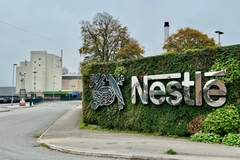
- Industry news
Industry news
- Category news
Category news
- Reports
- Key trends
- Multimedia
- Journal
- Events
- Suppliers
- Home
- Industry news
Industry news
- Category news
Category news
- Reports
- Key trends
- Multimedia
- Events
- Suppliers
FrieslandCampina Plans to Buy Green Energy from its Own Dairy Farmers

Together with Gasunie in The Netherlands and regional gas network managers, FrieslandCampina is working on facilities that allow its member dairy farmers to supply the gas they produce to the gas network as efficiently as possible.

10 Sep 2009 --- The co-operative dairy company FrieslandCampina will be supporting member dairy farmers who produce their own green energy in a variety of ways. One way is for the member dairy farmers in question to sell FrieslandCampina so-called green gas certificates from 1 January 2010 at a market-related price. This, along with a similar scheme for renewably generated electricity, allows FrieslandCampina to meet part of the energy requirement of its production companies. The initiatives are consistent with FrieslandCampina’s aim to actively achieve a more sustainable dairy chain.
This was announcedby CEO, Cees ’t Hart, at the Firma Stokman dairy company in Koudum (the Netherlands) to mark the opening of the Dutch Dairy Farming Academic year and the opening of the ‘Free Choice Cattle Shed’ of the Stokman family. The Stokman company is one of the pioneers in the dairy sector when it comes to animal welfare and sustainable energy.
“We want to support dairy farmers to produce profitable green energy. The business case has to be a good one. It applies to individual dairy farmers, to FrieslandCampina and to the dairy chain as a whole”, says ‘t Hart. FrieslandCampina is taking a number of concrete steps in the field of green gas, which is produced by fermenting manure, among other methods.
Together with Gasunie in The Netherlands and regional gas network managers, FrieslandCampina is working on facilities that allow its member dairy farmers to supply the gas they produce to the gas network as efficiently as possible.
If a dairy farmer supplies green gas to the network and receives so-called green certificates in return, he or she can sell the certificates to FrieslandCampina at a market-related price.
If dairy farmers produce green gas close to one of FrieslandCampina’s production sites and if there is sufficient supply, FrieslandCampina is willing to arrange for the production site to buy the green gas directly from the dairy farmers at market-related prices. FrieslandCampina will then invest in incinerators that can run on green gas at the production sites involved.
“We’re facilitating the sale of green gas. This helps dairy farmers in their decision-making and in their loan applications to the bank”, says Cees ’t Hart. FrieslandCampina wants to be operational in this field by 1 January 2010. Cees ‘t Hart: “So that dairy farmers can register with FrieslandCampina’s energy contact point, so to speak. By then, we also want more transparency when it comes to the price we want to pay for the sustainable energy certificates.”
The focus is on the Netherlands, but FrieslandCampina will be identifying how this kind of approach can be formulated for the German production sites and the German member dairy farmers.
‘t Hart says that if dairy farmers encounter bottlenecks in relation to subsidies and conditions, FrieslandCampina will use its expertise to help solve problems. “One aspect that is concerning FrieslandCampina is that the current rules do not provide for a link between the purchase of green gas certificates and the expansion of the CO2 rights. If we purchase green gas directly, there is a link with CO2 rights and we have greater CO2 capacity. This link is vital to the business case of green gas certificates. If the chain is to achieve the sustainability it is aiming for, the rules and regulations need to change in this area.”
We have already had our first purchase of certified green gas. De Marke in Hengelo (the Netherlands), a dairy farm of Wageningen UR Livestock Research, has the first manure fermentation unit in the Netherlands that supplies green gas to the natural gas network. FrieslandCampina buys the green certificates of this dairy farm, which is a member farmer of FrieslandCampina.
The approach to green gas also applies to FrieslandCampina dairy farmers who generate electricity using wind power or solar panels, which they supply to the network. Today, some 30 FrieslandCampina members in the Netherlands generate their own sustainable electricity.
The FrieslandCampina initiatives results from the agreement of the Dutch dairy industry to make the dairy chain sustainable. Between 2005 and 2020, energy efficiency must improve by 2% annually, 1.5% at production sites and 0.5% in the chain. Furthermore, the Dutch dairy industry wants to purchase 100% sustainable energy in 2020, preferably supplied by dairy farmers. Currently, 7% of the electricity of FrieslandCampina’s Dutch production sites is generated sustainably.
One of FrieslandCampina’s important goals is to reduce the greenhouse gasses that cause global warming. On the one hand, the carbon dioxide emitted when fossil fuels, such as oil and gas, are burned and the use of electricity at production sites; on the other hand, this is the methane expelled by cows when they digest grass. ‘t Hart emphasises that FrieslandCampina’s main aim is to serve consumers and professional clients with dairy by processing and selling member milk. “To process and valorise milk properly we need gas and electricity. If we can meet our energy needs with sustainable electricity supplied by our member dairy farmers, that’s a fantastic step forwards.”









